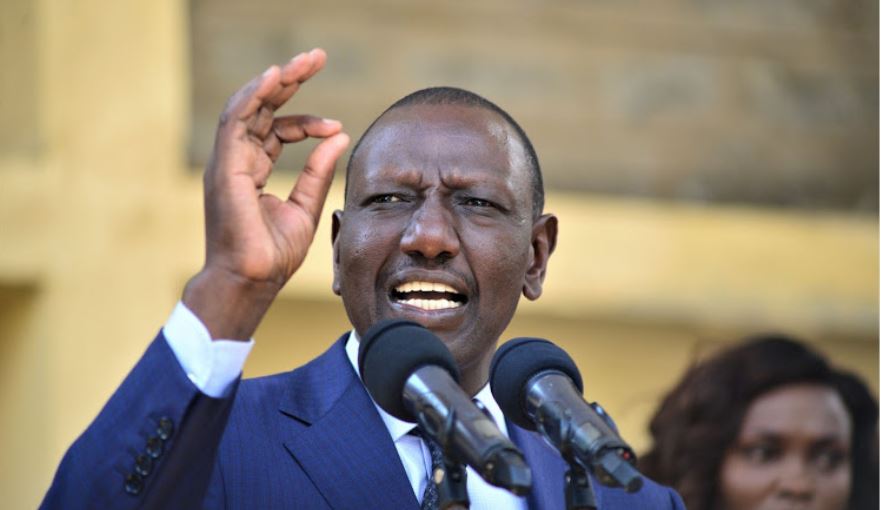Goodies for MPs as Ruto pushes to pass tax plan

President William Ruto yesterday promised a number of goodies to lawmakers from Kenya Kwanza as he rallied them to pass the Finance Bill without changes.
In a marathon eight-hour meeting at State House, Ruto told the MPs that contrary to claims by the Azimio side that the Finance Bill is oppressive, it is the exact opposite as it has come up with proposals that will benefit lower cadre Kenyans.
Among the goodies the MPs were promised include construction of 200 affordable houses in each constituency, the setting up of 2,500 free Wi-Fi hotspots in all markets and bus stops countrywide, creation of 1,450 ward-based digital hubs and constituency digital laboratories, the exemption of Value Added Tax (VAT) on Liquefied Petroleum Gas (LPG), lowering of the cost of gas cylinders to about Sh500 as well as zero-rating of supply of maize flour.
Yesterday’s meeting, which kicked off at about 8:30am, also saw MPs taken through presentations on the status of Kenya’s debt levels and what needs to be done to reduce the burden. Sources who attended the meeting said Ruto assured them that the government would not default on repaying the loans taken by his predecessors.
“The boss called us because he is keen on having the Finance Bill passed,” an MP who requested not to be identified told People Daily. “He engaged us to pass it. We were taken through each and every section of the Bill. It was like we were in class.
“Experts came to give us insights into the Finance Bill and what is proposed and why we need to pass it. The Housing Levy Fund, which is the most controversial part, is where we spent so much time.”
Ruto, who was hosting MPs from the Kenya Kwanza Alliance for the sixth Parliamentary Group meeting since he took over office in September last year, took time to explain to the legislators why he wanted some of the controversial proposals passed, particularly the Housing Fund Levy, which he has in the past described as a saving that can be redeemed after seven years rather than a tax.
After the talks, Ruto took to social media to explain that the meeting discussed the Finance Bill, progress of the Hustler Fund, Kenya’s greening agenda, the Housing Fund and the country’s economic status.
“The consistent exchange of ideas among leaders is an integral part of making sure that we deliver our commitments to the people of Kenya and actualise our plan to move this country forward,” he said, as he announced that he had also chaired the Kenya Kwanza Parliamentary Group.
Sources at the meeting revealed that Ruto had lined up several Cabinet and Principal Secretaries with instructions to convince the MPs to support the Bill when Parliament resumes sittings on June 6.
Middle class
Kimilili MP Didmus Barasa said once the housing levy passes through, the government should cushion civil servants already servicing loans from further deductions by ensuring that they should not be deducted more than two thirds of their salaries.
“From that levy, we need to find out how we can have a government policy that says that we should not commit more than two thirds of our salaries to servicing loans because a number of civil servants are servicing loans,” said Barasa.
The move comes just days after Azimio la Umoja Coalition leader Raila Odinga criticised the Finance Bill, saying that it was going to punish middle class workers if passed without amendments. He also said he would marshal Opposition MPs to vote against the Bill.
“Yes, the country is ripe for tax reforms, but the Finance Bill, 2023, is not one of them. The Finance Bill, 2023 is severely punishing the middle class people who are already suffering. It doesn’t spur economic growth at all,” Raila said.
Although robust debate is expected on the floor of the House once the Bill is tabled, there is a likelihood that it could be passed since the Kenya Kwanza Alliance requires a simple majority. However, civil society representatives from the Coast have warned legislators from the region against voting for it. One MP from Central Kenya also took to social media last week to announce that he would vote against the Bill despite being in Kenya Kwanza.
Following questions raised by MPs regarding the housing fund, Housing PS Charles Hinga was allocated more time to explain the how the contribution will work.
Hinga explained how the fund will be used to finance affordable houses for the many non-housed Kenyans, and that the levy would be a savings plan deduction with benefits accruing to the employee that will enhance the national saving plan. Employers are expected to match every worker’s contribution shilling for shilling.
Big Four
Hinga told the MPs that once the levy is passed, each of the 290 constituencies will get 200 houses, which will be allocated to needy families and reduce the country’s housing deficit in urban centres. Ruto said the levy would also create over a million jobs in the construction sector annually.
“We have prepared this Budget carefully,” Ruto later told the legislators.
The proposed levy has already been met with criticism as experts have raised concerns about its timing, describing it as ill-informed given the difficult economic situation in the country.
The affordable housing project was born when the then President Uhuru Kenyatta introduced the Big Four agenda, which contained the affordable housing programme. At the time, the proposal was to have workers contribute 1.5 per cent of their salaries to the fund. However, this did not happen. In his election campaigns, Ruto promised to rethink the programme but this has sparked controversy.
An MP who sought anonymity said: “The most thorny issue was the housing fund levy. A lot of time was taken on this so that all members could understand. And were promised that by the end of it all, each constituency will have at least 200 houses.”
ICT Cabinet Secretary Eliud Owalo gave a talk on building the digital superhighway, setting up the free wi-fi hotspots in all markets and bus parks as well as the creation of 1,450 ward-based digital hubs and constituency digital laboratories. He told MPs to submit to his office areas and stations that they would want the Wi-Fi hotspots set up.
On lowering the cost of living, National Treasury Principal Secretary Chris Kiptoo is said to have assured the lawmakers that the proposals in the tax measures were beneficial to Kenyans.
Kiptoo cited the removal of the eight per cent VAT applicable to cooking gas, reduction of the rate of import duty declaration and railway development levy from 3.5 to 2.5 per cent and that of railway development levy from two to 1.5 per cent as some of the gains that Kenyans will enjoy should MPs pass the Bill, which Treasury CS Njuguna Ndung’u will table in the House on June 13.
However, MPs raised concerns over the proposal to increase VAT on petroleum products from eight to 16 per cent, saying this will have a negative impact on Kenyans especially now that the cost of living has gone up.








